- Home
- Iain M. Banks
Excession Page 6
Excession Read online
Page 6
~ D and G, you’re begging me? Genar-Hofoen asked with a laugh in his thought, as the blue-collared scratchound writhed hopelessly in the other beast’s jaws and Fivetide started to turn to him.
~ Yes, I am! Now will you agree? Time is of the essence!
From the corner of one eye, Genar-Hofoen watched one of Fivetide’s limbs begin to flip towards him. He readied his slow-reacting body for the blow.
~ I’ll think about it.
~ But--!
~ Quit that signal, suit. Tell the module not to wait up. Now, suit - command instruction: take yourself off-line until I call on you.
Genar-Hofoen halted the effects of the quicken. He smiled and sighed a happy sigh as Fivetide’s celebratory blow landed with a teeth-rattling thud on his back and the Culture lost a thousand suckers. Could be a fun evening.
IV
The horror came for the commandant again that night, in the grey area that was the half-light from a full moon. It was worse this time.
In the dream, he rose from his camp bed in the pale light of dawn. Down the valley, the chimneys above the charnel wagons belched dark smoke. Nothing else in the camp was moving. He walked between the silent tents and under the guard towers to the funicular, which took him up through the forests to the glaciers.
The light was blinding white and the cold, thin air rasped the back of his throat. The wind buffeted him, raising veils of snow and ice that shifted across the fractured surface of the great river of ice, contained between the jagged banks of the rock-black and snow-white mountains.
The commandant looked around. They were quarrying the deep western face now; it was the first time he had seen this latest site. The face itself lay inside a great bowl they had blasted in the glacier; men, machines and drag-lines moved like insects in the bottom of the vast cup of shining ice. The face was pure white except for a speckling of black dots which from this distance appeared just like boulders. It looked dangerously steep, he thought, but cutting it at a shallower angle would have taken longer, and they were forever being hurried along by headquarters . . .
At the top of the inclined ramp where the drag lines released their hooked cargoes, a train waited, smoke drifting blackly across the blindingly white landscape. Guards stamped their feet, engineers stood in animated discussion by the winch engine and a caravan shack disgorged another shift of stackers fresh from a break. A sledge full of face-workers was being lowered down the huge gash in the ice; he could make out the sullen, pinched faces of the men, bundled in uniforms and clothes that were little better than rags.
There was a rumble, and a vibration beneath his feet.
He looked round to the ice face again to see the entire eastern half of it crumbling away, collapsing and falling with majestic slowness in billowing clouds of whiteness onto the tiny black dots of the workers and guards below. He watched the little figures turn and run from the rushing avalanche of ice as it pressed down through the air and along the surface towards them.
A few made it. Most did not, disappearing under the huge white wave, rubbed out amongst that chalky, glittering turmoil. The noise was a roar so deep he felt it in his chest.
He ran along the lip of the face-cut to the top of the inclined plane; everybody was shouting and running around. The entire bottom of the bowl was filling with the white mist of the kicked-up snow and pulverised ice, obscuring the still-running survivors just as the ice-fall itself had those it had buried.
The winch engine laboured, making a high, screeching noise. The drag lines had stopped. He ran on to the knot of people gathering near the inclined plane.
I know what happens here, he thought. I know what happens to me. I remember the pain. I see the girl. I know this bit. I know what happens. I must stop running. Why don’t I stop running? Why can’t I stop? Why can’t I wake up?
As he got to the others, the strain on the trapped drag line - still being pulled by the winch engine - proved too much. The steel hawser parted somewhere down inside the bowl of mist with a noise like a shot. The steel cable came hissing and sizzing up through the air, snaking and wriggling as it ripped up the slope towards the lip, loosing most of its grisly cargo from its hooks as it came, like drops of ice off a whip.
He screamed to the men at the top of the inclined plane, and tripped, falling onto his face in the snow.
Only one of the engineers dropped in time.
Most of the rest were cut neatly in half by the scything hawser, falling slowly to the snow in bloody sprays. Loops of the hawser smacked off the railway engine with a thunderous clanging noise and wrapped themselves around the winch housing as though with relief; other coils thumped heavily to the snow.
Something hit his upper leg with the force of a fully swung sledgehammer, breaking his bones in a cataclysm of pain. The impact rolled him over and over in the snow while the bones ground and dug and pierced; it went on for what felt like half a day. He came to rest in the snow, screaming. He was face-to-face with the thing that had hit him.
It was one of the bodies the drag line had flicked off as it tore up the slope, another corpse they had hacked and loosened and pulled like a rotten tooth from the new face of the glacier that morning, a dead witness that it was their duty to discover and remove with all dispatch and secrecy to the charnel wagons in the valley below to be turned from an accusatory body to innocent smoke and ash. What had hit him and shattered his leg was one of the bodies which had been dumped in the glacier half a generation ago, when the enemies of the Race had been expunged from the newly conquered territories.
The scream forced its way out of his lungs like something desperate to be born to the freezing air, like something aching to join the screams he could hear spread around him near the lip of the inclined plane.
The commandant’s breath was gone; he stared into the rock-hard face of the body that had hit him and he sobbed for breath to scream again. It was a child’s face; a girl’s.
The snow burned his face. His breath would not come back. His leg was a burning brand of pain lighting up his whole body.
But not his eyes. The view began to dim.
Why is this happening to me? Why won’t it stop? Why can’t I stop it? Why can’t I wake up? What makes me re-live these terrible memories?
Then the pain and the cold went away, seemed to be taken away, and another kind of coldness came upon him, and he found himself
... thinking. Thinking about all that had happened. Reviewing, judging.
... In the desert we burned them immediately. None of this sloppiness. Was it some attempt at poetry, to bury them in the glacier? Interred where they were so far up the ice sheet, their bodies would stay in the ice for centuries. Buried too deep for anyone to find without the killing effort we had to put into it. Did our leaders begin to believe their own propaganda, that their rule would last a hundred lifetimes, and so started to think that far ahead? Could they see the melt-lakes below the glacier’s ragged, dirty skirt, all those centuries from now, covered with the floating bodies released from the ice’s grip? Did it start to worry them what people would think of them then? Having conquered all the present with such ruthlessness, did they embark on a campaign to defeat the future too, make it love them as we all pretend to?
... In the desert we burned them immediately. They came out in the long trains through the burning heat and the choking dust and the ones that hadn’t died in the black trucks we offered copious water; no will could resist the thirst those baking days spent amongst death had built up in them.
They drank the poisoned water and died within hours. We incinerated the plundered bodies in solar furnaces, our offering to the insatiable sky gods of Race and Purity. And there seemed to be something pure about the way they were disposed of, as though their deaths gave them a nobility they could never have achieved in their mean, degraded lives. Their ashes fell like a lighter dust on the powderous emptiness of the desert, to be blown away together in the first storm.
The last furnace loads were the camp w
orkers - gassed in their dormitories, mostly - and all the paperwork: every letter, every order, every requisition pad, stores sheet, file, note and memo. We were all searched, even I. Those the special police found hiding diaries were shot on the spot. Most of our effects went up in smoke, too. What we were allowed to keep had been searched so thoroughly we joked they had managed to remove each grain of sand from our uniforms, something the laundry had never been able to do.
We were split up and moved to different posts throughout the conquered territories. Reunions were not encouraged.
I thought of writing down what had happened - not to confess but to explain.
And we suffered, too. Not just in the physical conditions, though those were bad enough, but in our minds, in our consciences. There may have been a few brutes, a few monsters who gloried in it all (perhaps we kept a few murderers off the streets of our cities for all that time), but most of us went through intermittent agonies, wondering in moments of crisis if what we were doing was really right, even though in our hearts we knew it was.
So many of us had nightmares. The things we saw each day, the scenes we witnessed, the pain and terror; these things could not help but affect us.
Those we disposed of; their torment lasted a few days, maybe a month or two, then it was over as quickly and efficiently as we could make the process.
Our suffering has gone on for a generation.
I am proud of what I did. I wish it had not fallen to me to do what had to be done, but I am glad that I did it to the best of my capabilities, and I would do it again.
That was why I wanted to write down what had happened; to witness our belief and our dedication and our suffering.
I never did.
I am proud of that too.
He awoke and there was something inside his head.
He was back in reality, back in the present, back in the bedroom of his house in the retirement complex, near the sea; he could see the sunlight hitting the tiles of the balcony outside the room. His twinned hearts thumped, the scales had risen on his back, prickling him. His leg ached, echoing with the pain of that ancient injury on the glacier.
The dream had been the most vivid yet, and the longest, finally taking him to the ice-fall in the western face and the accident with the drag line (deep buried, that had been, in his memory, submerged beneath all the dread white weight of his remembered pain). As well as that, whatever he had experienced had gone beyond the normal course, the usual environment of dreams, propelled there by the reliving of the accident and the image of fighting for breath while he stared transfixed into the face of the dead girl.
He had found himself thinking, explaining, even justifying what he had done in his army career, in the most definitive part of his life.
And now he could feel something inside his head.
Whatever it was inside his head got him to close his eyes.
~ At last, it said. It was a deep, deliberately authoritative voice, its pronunciation almost too perfect.
At last? he thought. (What was this?)
~ I have the truth.
What truth? (Who was this?)
~ Of what you did. Your people.
What?
~ The evidence was everywhere; across the desert, caked in loam, lodged in plants, sunk to the bottom of lakes, and there in the cultural record too; the sudden vanishings of art works, changes in architecture and agriculture. There were a few hidden records - books, photographs, sound recordings, indices, which contradicted the re-written histories - but they still didn’t directly explain why so many people, so many peoples seemed to vanish so suddenly, without any sign of assimilation.
What are you talking about? (What was this in his head?)
~ You would not believe what I am, commandant, but what I am talking about is a thing called genocide, and the proof thereof.
We did what had to be done!
~ Thank you, we’ve just been through all that. Your self-justifications have been noted.
I believed in what I did!
~ I know. You had the residual decency to question it occasionally, but in the end you did indeed believe in what you were doing. That is not an excuse, but it is a point.
Who are you? What gives you the right to crawl inside my brains?
~ My name would be something like Grey Area in your language. What gives me the right to crawl inside your brains, as you put it, is the same thing that gave you the right to do what you did to those you murdered; power. Superior power. Vastly superior power, in my case. However, I have been called away and I have to leave you now, but I shall return in a few months and I’ll be continuing my investigations then. There are still enough of you left to construct a more . . . triangulated case.
What? he thought, trying to open his eyes.
~ Commandant, there is nothing worse I can wish upon you than to be what you already are, but you might care to reflect upon this while I’m gone:
Instantly, he was back in the dream.
He fell through the bed, the single ice-white sheet tore beneath him and tumbled him into a bottomless tank of blood; he fell down through it to light, and the desert, and the rail line through the sands; he fell into one of the trains, into one of the trucks and was there with his broken leg amongst the stinking dead and the moaning living, jammed in between the excrement-covered bodies with the weeping sores and the buzz of the flies and the white-hot rage of the thirst inside him.
He died in the cattle truck, after an infinity of agony. There was time for the briefest of glimpses of his room in the retirement complex. Even in his still-shocked, pain-maddened state he had the time and the presence of mind to think that while it felt as though a day at least must have passed while he had been submerged in the torture-dream nevertheless everything in the bedroom looked just as it had earlier. Then he was dragged under again.
He awoke entombed inside the glacier, dying of cold. He had been shot in the head but it had only paralysed him. Another endless agony.
He had a second impression of the retirement home; still the sunlight was at the same angle. He had not imagined it was possible to feel so much pain, not in such a time, not in a life-time, not in a hundred lifetimes. He found there was just time to flex his body and move a finger’s width across the bed before the dream resumed.
Then he was in the hold of a ship, crammed in with thousands of other people in the darkness, surrounded again by stink and filth and screams and pain. He was already half dead two days later when the sea valves opened and those still left alive began to drown.
The cleaner found the old retired commandant twisted into a ball a little way short of the apartment’s door the next morning. His hearts had given out.
The expression on his face was such that the retirement-home warden almost fainted and had to sit down quickly, but the doctor declared the end had probably been quick.
V
[tight beam, M16.4, tra. @n4.28.858.8893]
xGCU Grey Area
oGSV Honest Mistake
There. I am on my way.
∞
xGSV Honest Mistake
oGCU Grey Area
Not before time.
∞
There was work to be done.
∞
More animal brains to be delved into?
∞
History to be unearthed. Truth to be discovered.
∞
I would have thought that one of the last places one would have
expected to find on any itinerary concerning the search for truth
would be inside the minds of mere animals.
∞
When the mere animals concerned have orchestrated one of the most successful and total expungings of both a significant part of their own species and every physical record regarding that act of genocide, one has remarkably little choice.
∞
I’m sure no one would deny your application does you credit.
∞
Gosh, thanks. That m
ust be why the other ships call me
Meatfucker.
∞
Absolutely.
Well, let me wish you all the best with whatever it is our friends
might require of you.
∞
Thank you.
My aim is to please . . .
∞
(End signal file.)
VI
He left a trail of weaponry and the liquefied remains of gambling chips. The two heavy micro rifles clattered to the absorber mat just outside the airlock door and the cloak fell just beyond them. The guns glinted in the soft light reflecting off gleaming wooden panels. The mercury gambling chips in his jacket pocket, exposed to the human-ambient heat of the module’s interior, promptly melted. He felt the change happen, and stopped, mystified, to stare into his pockets. He shrugged, then turned his pockets inside out and let the mercury splash onto the mat. He yawned and walked on. Funny the module hadn’t greeted him.
The pistols bounced on the carpeted floor of the hall and lay beading with frost. He left the short jacket hanging on a piece of sculpture in the hall. He yawned again. It was not far off the time of habitat dawn. Very much time for bed. He rolled down the tops of the knee-boots and kicked them both down the corridor leading to the swimming pool.
He was pulling down his trousers as he entered the module’s main social area, shuffling forward bent over and holding on to the wall as he cursed the garments and tried to kick them off without falling over.
There was somebody there. He stopped and stared.
It looked very much like his favourite uncle was sitting in one of the lounge’s best seats.
Genar-Hofoen stood upright and swayed, staring through numerous blinks.
‘Uncle Tishlin?’ he said, squinting at the apparition. He leant on an antique cabinet and finally hauled his trousers off.
The figure - tall, white-maned and with a light smile playing on its craggily severe face - stood up and adjusted its long formal jacket. ‘Just a pretend version, Byr,’ the voice rumbled. The hologram put its head back and fixed him with a measuring, questioning look. ‘They really do want you to do this thing for them, boy.’

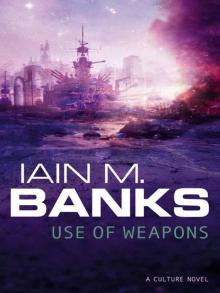 Use of Weapons
Use of Weapons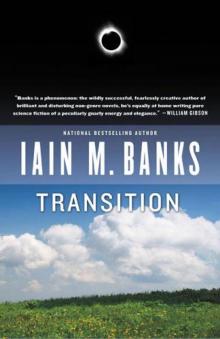 Transition
Transition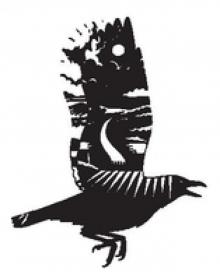 The Crow Road
The Crow Road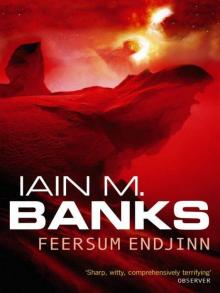 Feersum Endjinn
Feersum Endjinn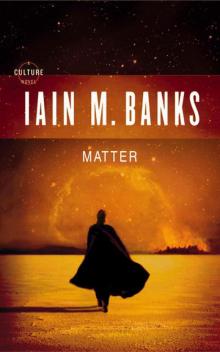 Matter
Matter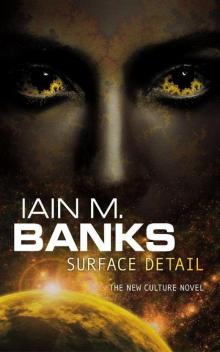 Surface Detail
Surface Detail The Wasp Factory
The Wasp Factory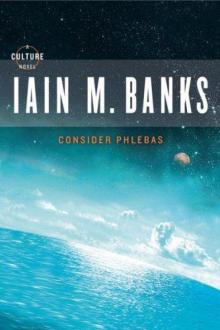 Consider Phlebas
Consider Phlebas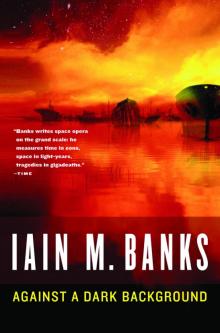 Against a Dark Background
Against a Dark Background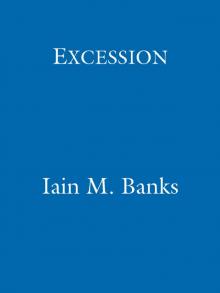 Excession
Excession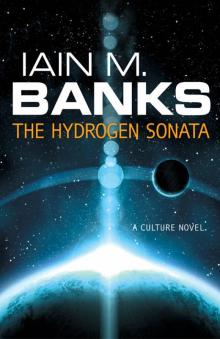 The Hydrogen Sonata
The Hydrogen Sonata The Algebraist
The Algebraist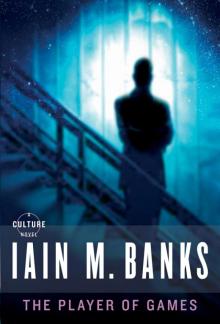 The Player of Games
The Player of Games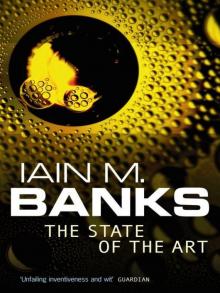 The State of the Art
The State of the Art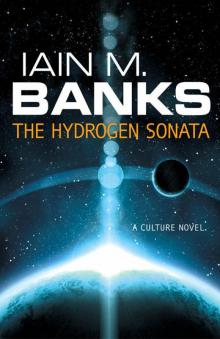 The Hydrogen Sonata c-10
The Hydrogen Sonata c-10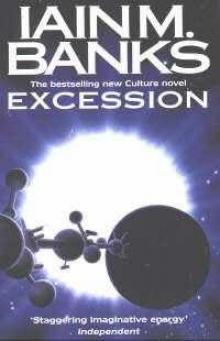 Excession c-5
Excession c-5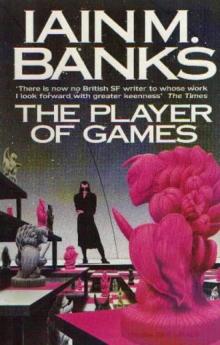 The Player of Games c-2
The Player of Games c-2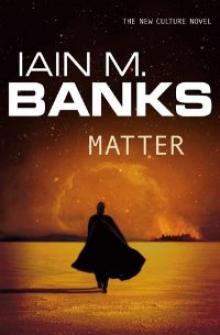 Matter c-8
Matter c-8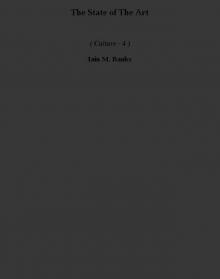 The State of The Art c-4
The State of The Art c-4 Look to Windward c-7
Look to Windward c-7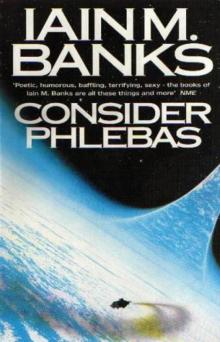 Consider Phlebas c-1
Consider Phlebas c-1